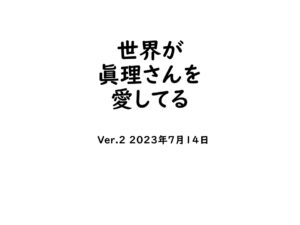追悼資料2(東京新聞田原牧さんによる記事)Memorial document 2 (article by Maki Tahara, Tokyo Shimbun).
以下記事本文を以下に引用させて頂き、英訳も添付します。
The text of the article is quoted below and an English translation is attached.
The sad news arrives suddenly. Mari Yamamoto (pen name Eiko Nagano), former secretary-general of the National Group of the “Mentally Ill”, an association of people with mental disabilities, and chairperson of the Centre for the Rights of the Mentally Ill, Kizuna, has died (aged 71).
I got to know her more than 20 years ago. I met her more than 20 years ago when I was covering the enactment of the Medical Observation Law for Persons of Insanity.
The law, which came into force in 2005, provides for compulsory treatment for persons who are not held criminally responsible because they have committed other harmful acts while insane or in other states. Although there was strong opposition to the law due to concerns that it would lead to de facto preventive detention (security measures), it was forcefully adopted.
During the parliamentary debate, Mz Yamamoto spoke as a witness against the law, and her words sum up her character.
She said: “[People subject to the law] are locked up deep in the closed wards of psychiatric hospitals or in protection rooms. They are the ones who should come here and speak as witnesses. (My words) may be perceived as the words of a traitor who took part in the deliberations without the person in question.”
Parties first. He was not intimidated by authoritative doctors or lawyers. That was Mz Yamamoto.
He was admitted to a psychiatric hospital at the age of 17 because he had stopped attending school. The name of his illness was depression. He was ‘tricked’ by doctors and given electroconvulsive therapy and lost part of his memory.
At the age of 22, he passed the University Entrance Qualification Examination and entered Waseda University, where he met a group of ‘sick’ people in his late 20s.
Seeing people who talked about themselves openly, she realized that it was okay for her to be angry and to express her feelings. I had friends who did not have to hide their illness. It encouraged me to recover my denied pride, which became the starting point of my partyism.
Although she sometimes spoke with a venomous tongue, she was a deeply compassionate person, with an appealing difference between the sharpness of her tongue and the smile on her face.
When we visited her at home for an interview, her mobile phone was ringing continuously. ‘I’m cooking in the kitchen, but I can’t move because I’m about to stab myself with a knife’. It was from the person concerned. She spoke slowly and released the tension.
It is important to be adored, but she is also a party. It must have been hard work. When a young activist in Hokkaido burnt herself to death in protest at a government office, I received a call telling me not to report too much. This was because they feared a chain of suicides.
The Convention on the Rights of Persons with Disabilities, of which she was part of the drafting process, was adopted by the UN in 2006. The UN Committee on the Rights of Persons with Disabilities examined Japan for the first time in 2010 and declared the forced hospitalization of people with mental disabilities to be “discrimination”. It called for the total abolition of related legislation.
However, the situation in Japan, a ‘psychiatric hospital powerhouse’, has not changed. Even in recent years, incidents of assault and abuse of patients have been uncovered at Kamide Hospital in Kobe and Takiyama Hospital in Hachioji, Tokyo. More than 70 people have committed suicide since the implementation of the Medical Probation Law, which was designed to ensure “careful treatment and social reintegration”.
Mr Yamamoto was hospitalized for cancer several years ago. Her face in her coffin had become twice as small.
During her hospitalization, I often asked myself: ‘What would she think? I am sure I was not the only one.

